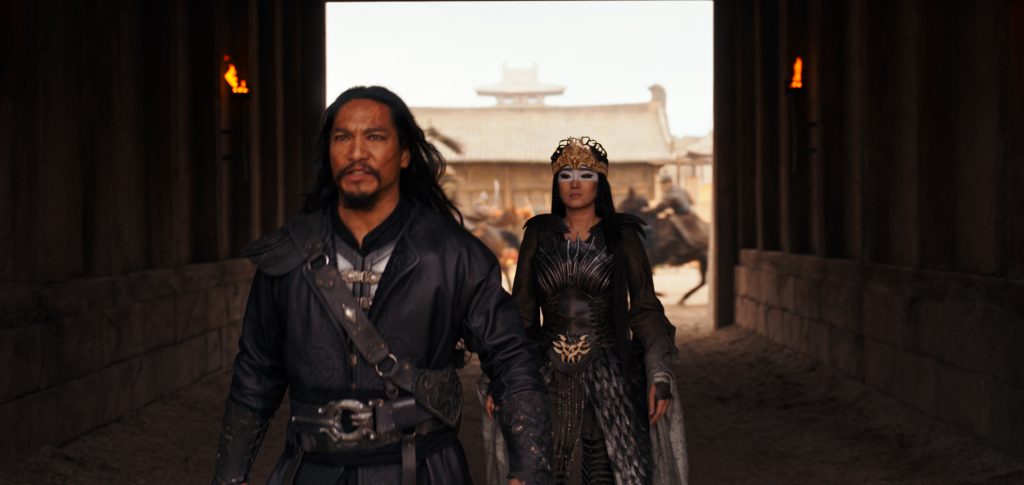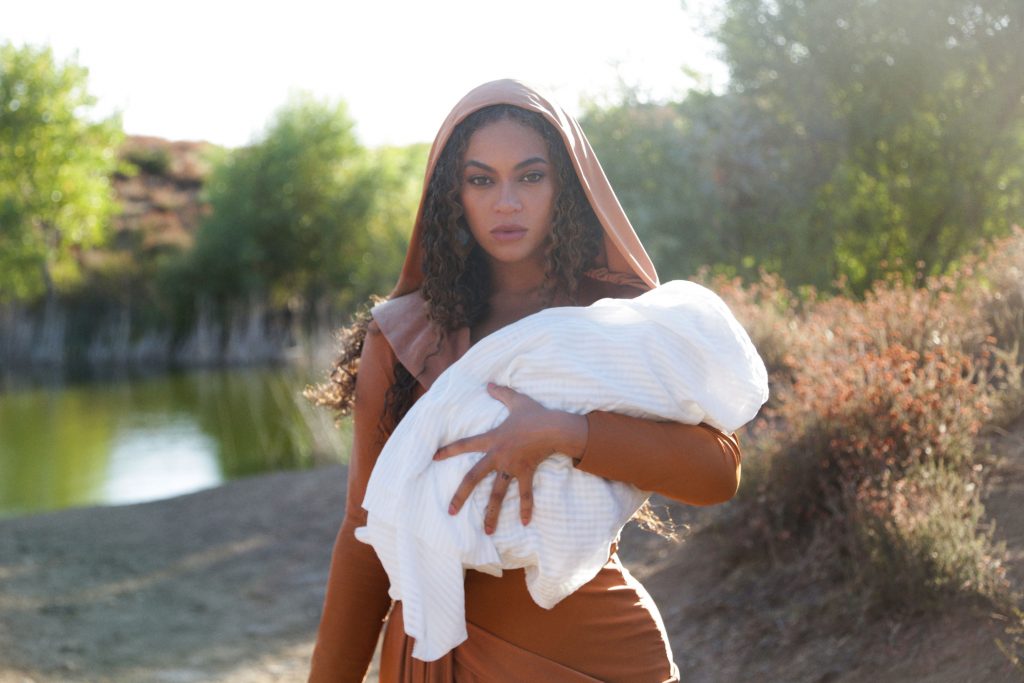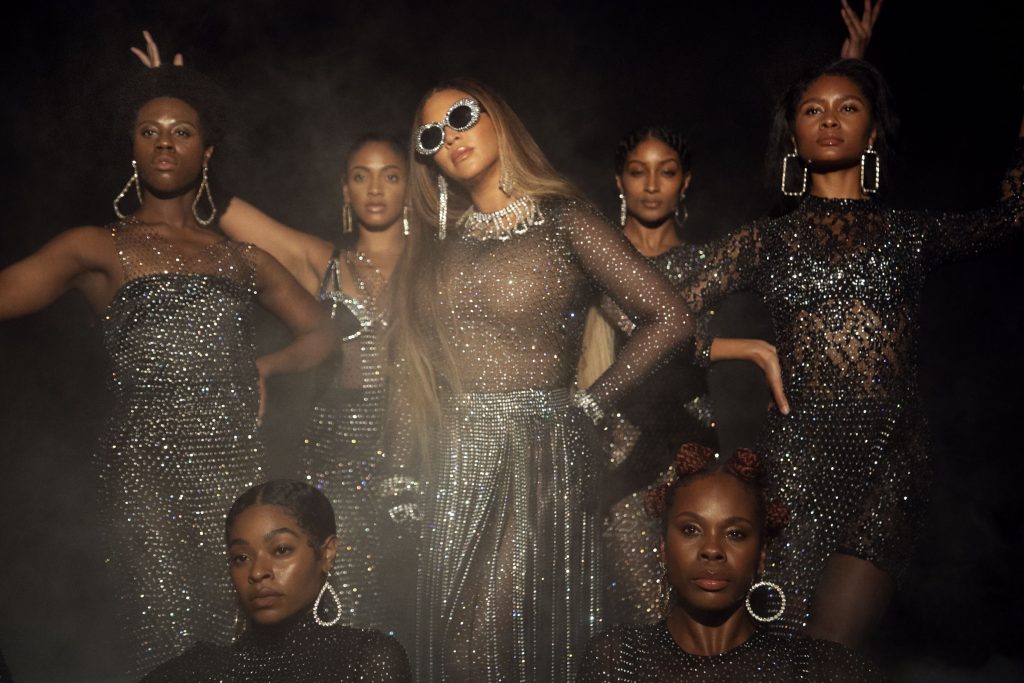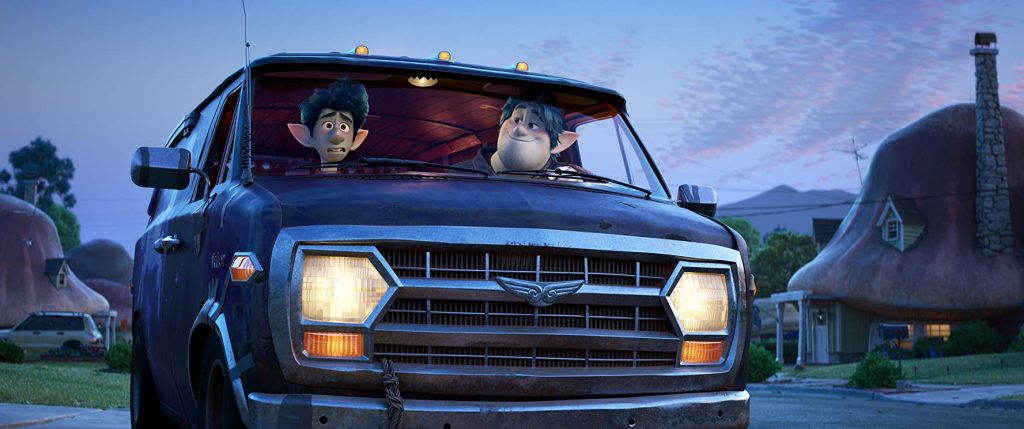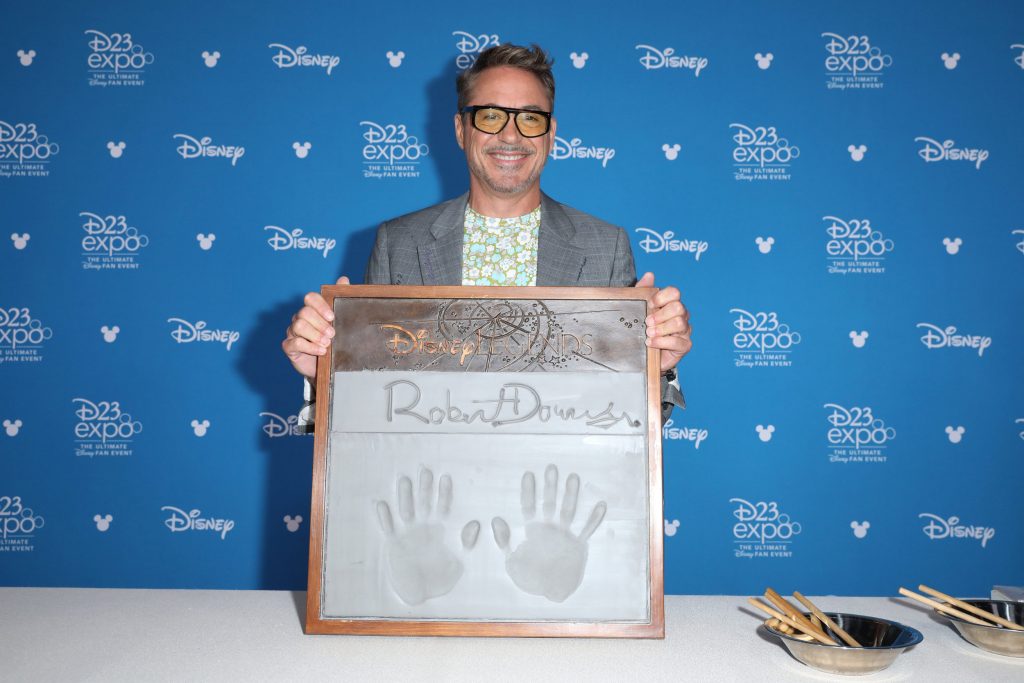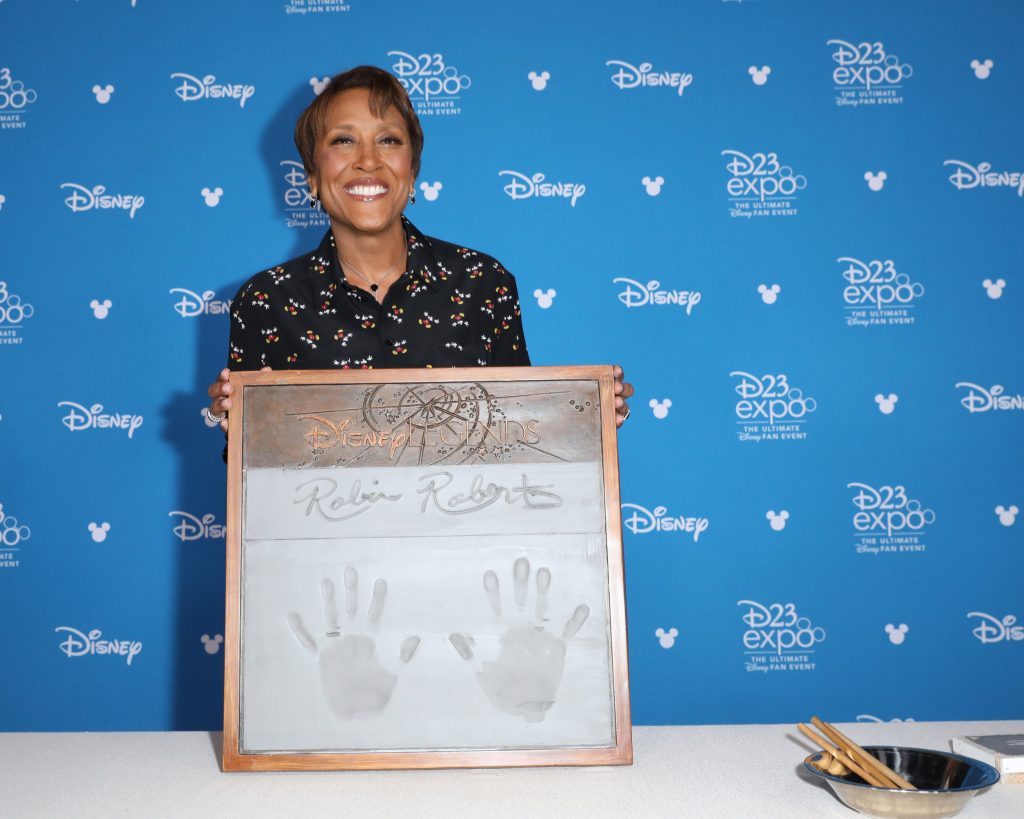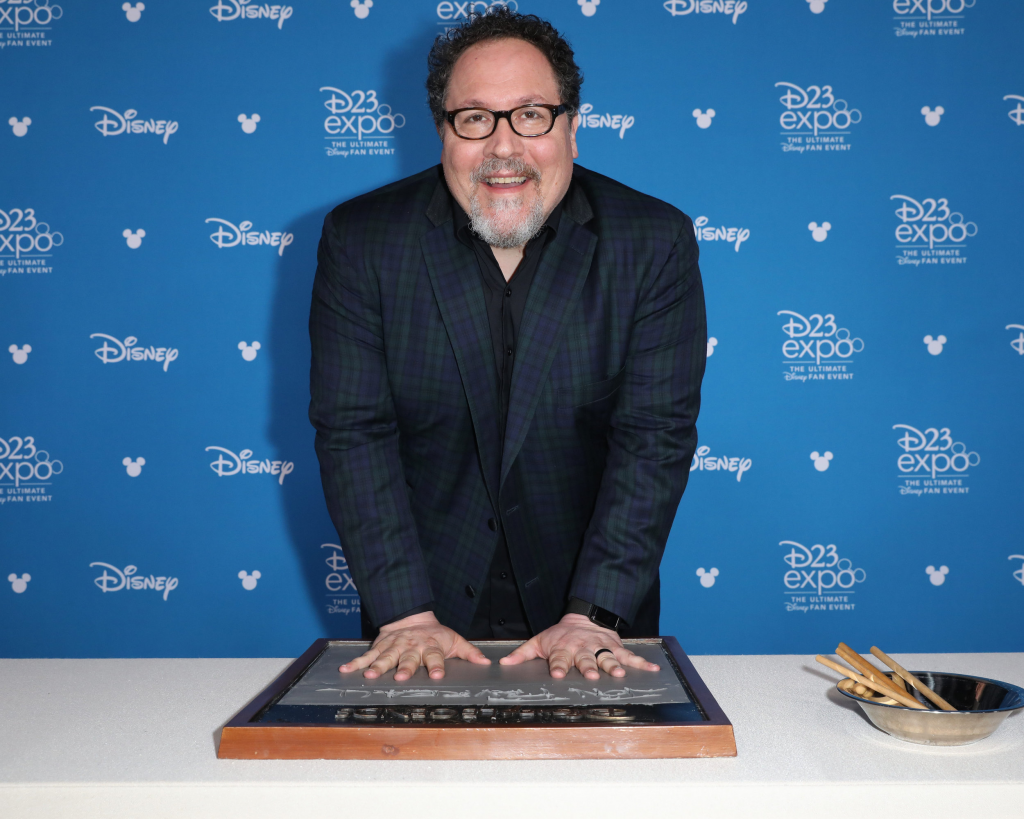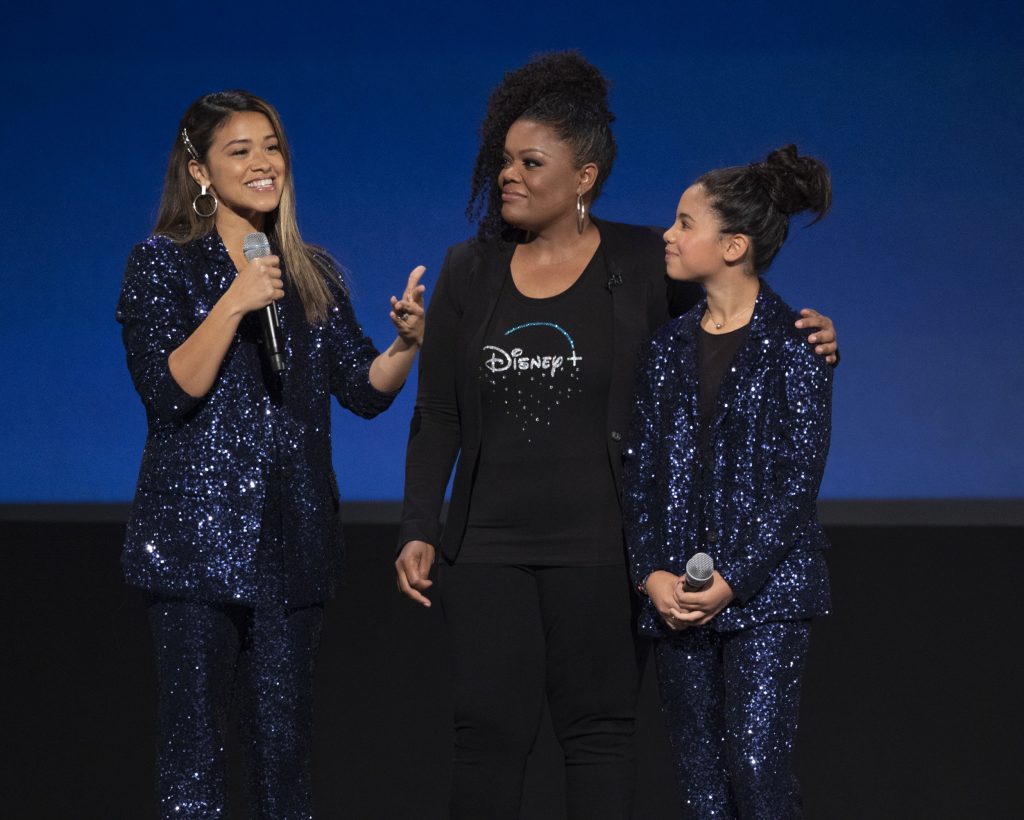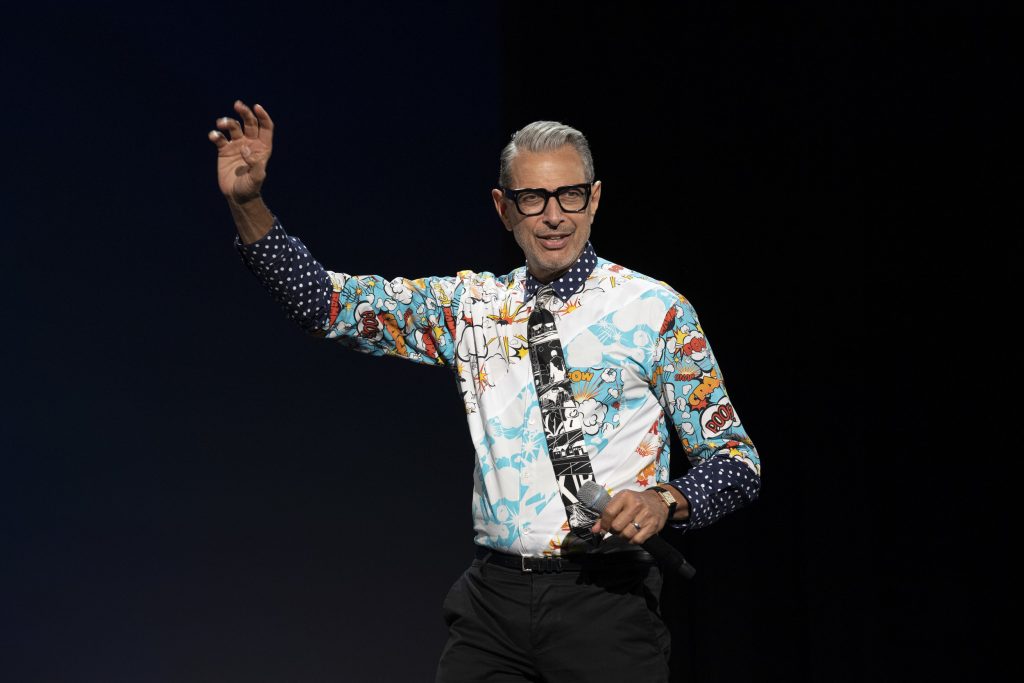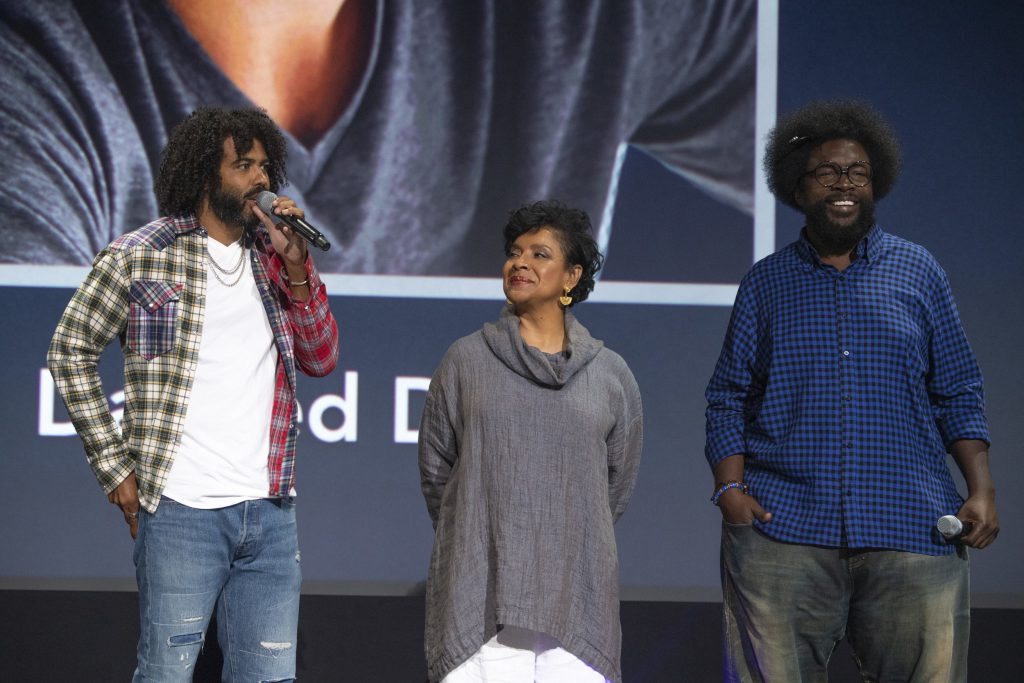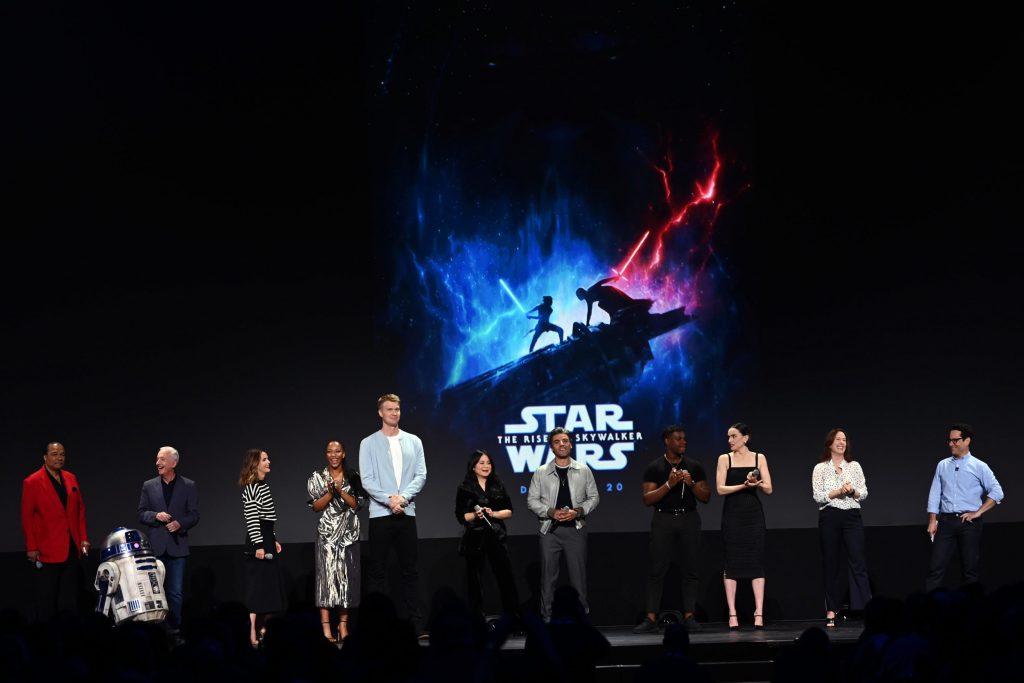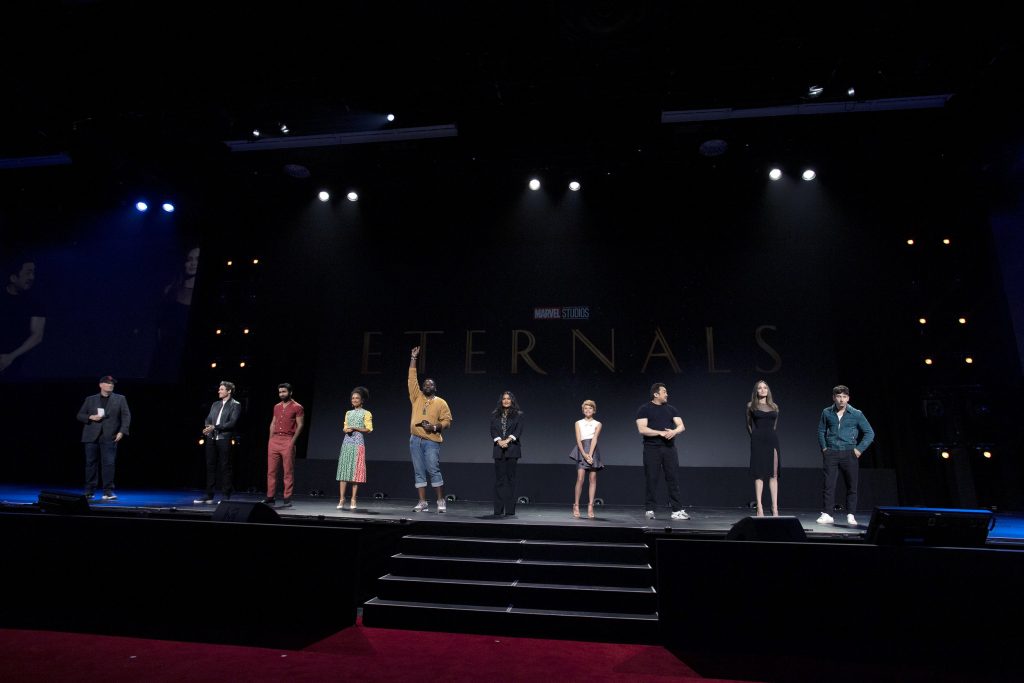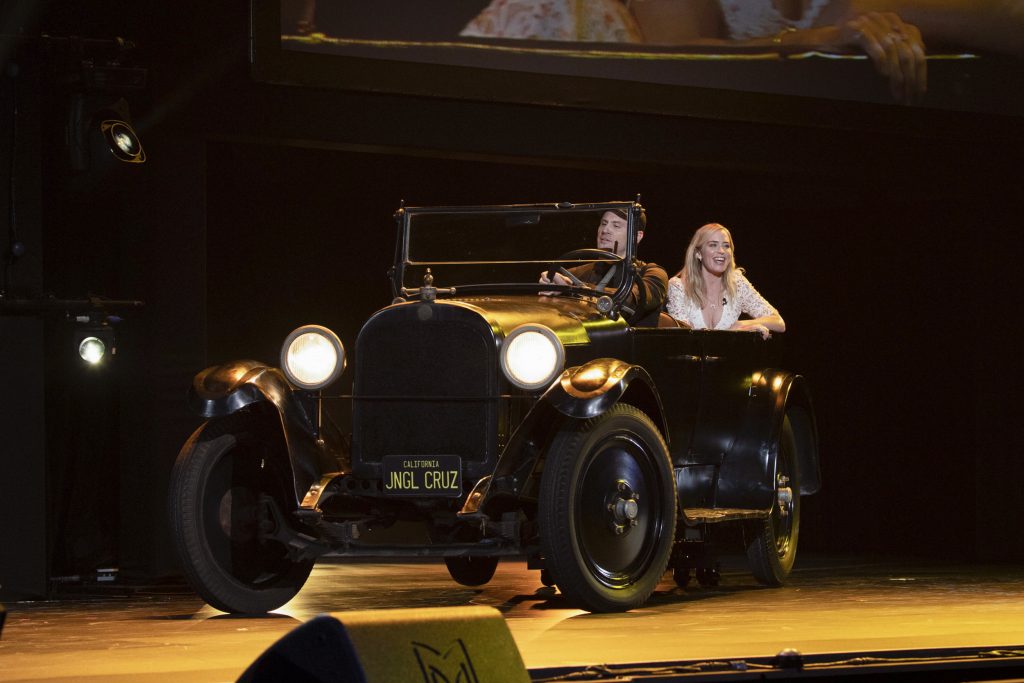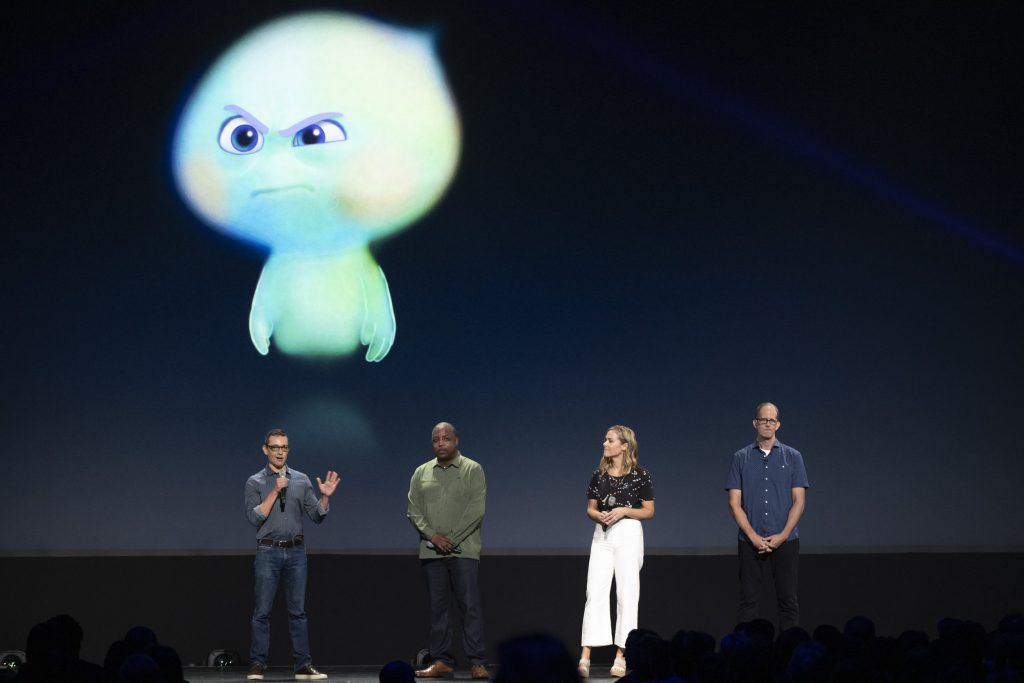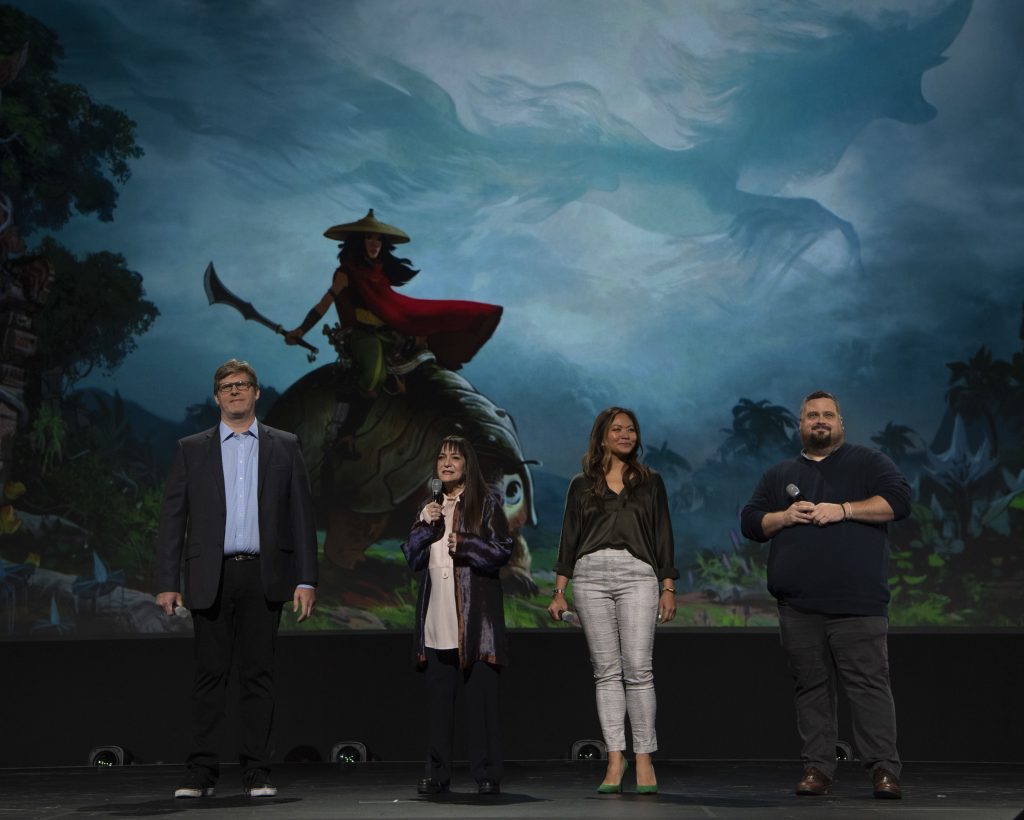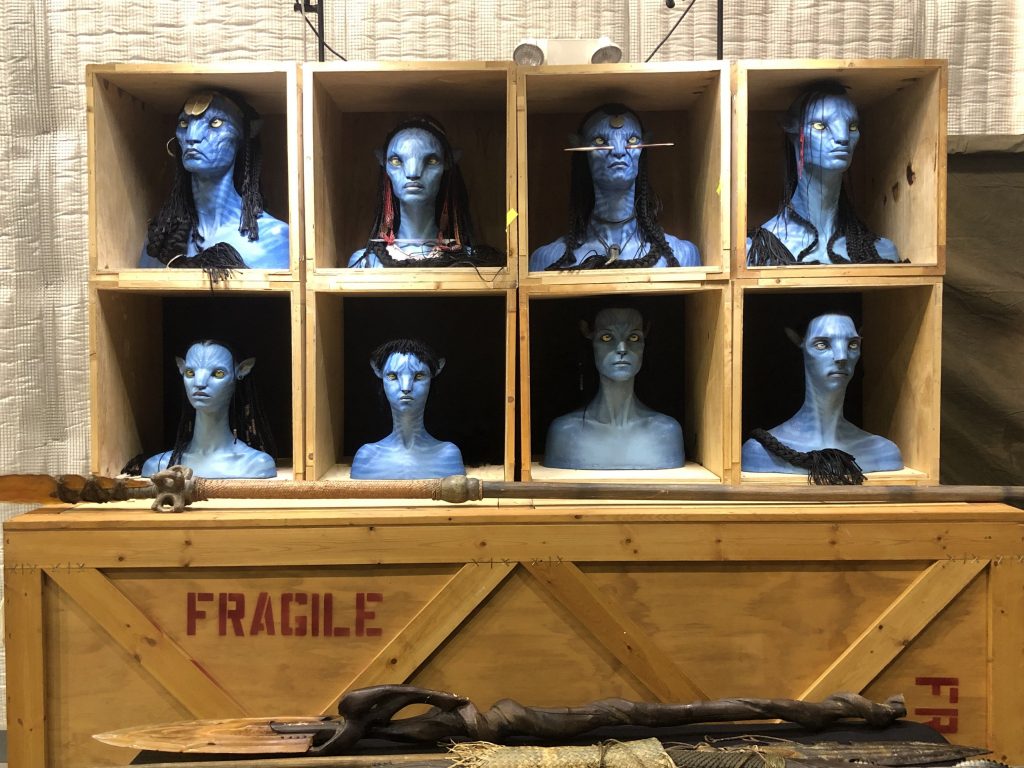December 26, 2020
by Carla Hay
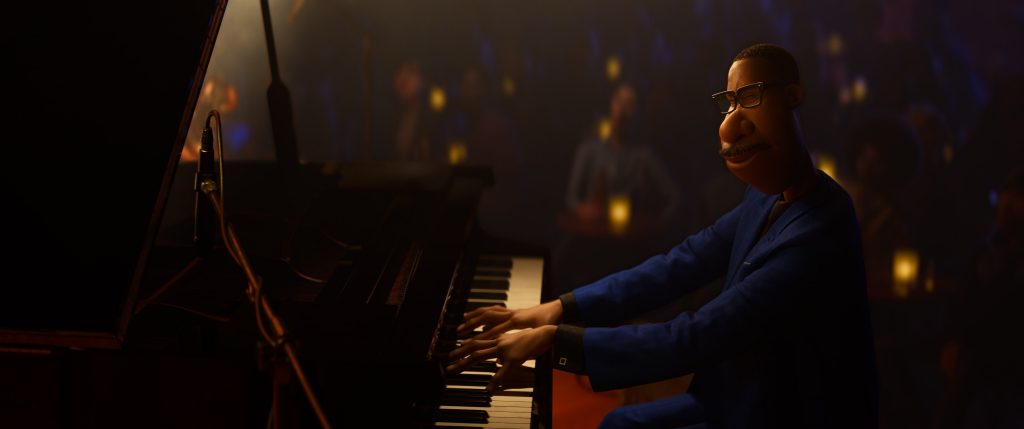
Directed by Pete Docter; co-directed by Kemp Powers
Culture Representation: The animated film “Soul” features a racially diverse cast of characters (African American and white, with a few Latinos and Asians) representing the middle-class.
Culture Clash: An aspiring jazz musician has a purgatory-like experience where he fights to save his life while encountering a cynical soul that doesn’t want to be born in any body.
Culture Audience: “Soul” will appeal primarily to people who are interested in philosophical stories about the meaning of life that are wrapped in a bright and shiny package of a Disney/Pixar animated movie.
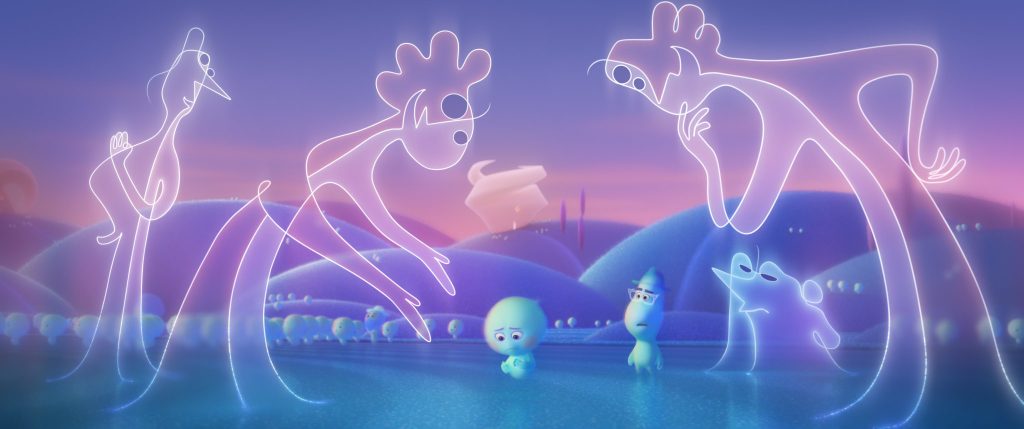
Pixar Animation Studios has long been the gold standard for groundbreaking and crowd-pleasing movie animation, with several Oscars and blockbuster films to prove it. Pixar launched in 1986, and was acquired by the Walt Disney Company in 2006. But it wasn’t until 2020 that Pixar released its first movie with an African American as the lead character. That movie is “Soul,” which does what Pixar does best: blend stunning visuals with sentimental, family-friendly messages. However, the movie isn’t quite the innovative cultural breakthrough that it’s hyped up to be.
“Soul” (directed by Pete Docter and co-directed by Kemp Powers) follows a lot of the same thematic tropes that are in a lot of Pixar movies: Someone has to cope with death and/or find a way back home. In order to reach that goal, the protagonist encounters someone who usually has an opposite personality. For any variety of reasons, the two opposite personalities are stuck together on a journey. And they spend most of the story bickering and/or trying to learn how to work together.
In “Soul,” the main protagonist is Joe Gardner (voiced by Jamie Foxx), a middle-aged, aspiring jazz pianist in New York City who hasn’t been able to fulfil his dream of becoming a professional musician. Instead, to pay his bills, Joe has become a teacher of band music at a public middle school called M.S. 70, where almost all of the students in his class are less-than-talented at playing music. Joe isn’t particularly happy with how his life has turned out, but he hasn’t lost his passion for playing jazz. It’s a passion that almost no one else shares in his life.
Joe tells his students about the life-changing experience he had as a boy when his father took him to a nightclub to see jazz performed live for the first time. It was the first time that Joe understood the joy of turning a passion into something that can be shared with others. Joe describes to his students how he felt when he saw the jazz musicians expressing themselves in their performance: “I wanted to learn how to talk like that. That’s when I knew I was born to play.”
Joe then says to a student, “Connie knows what I mean. Right, Connie?” Connie (voiced by Cora Champommier) deadpans in response: “I’m 12.” This won’t be the last time Connie will be in the movie, since she represents whether or not Joe has made an impact on any of his students.
Joe, who is an only child, is somewhat of a disappointment to his widowed mother Libba (voiced by Phylicia Rashad), who owns a custom tailor shop. Libba has grown tired of seeing Joe in a series of dead-end, part-time jobs that don’t pay very well. Joe’s father was also an aspiring musician, but he gave up his music dreams because of the financial obligations of raising a family. Joe is a bachelor with no children, so it’s been easier for him to not feel as much pressure to get a full-time job that pays well.
One day, M.S. 70’s Principal Arroyo (voiced by Jeannie Tirado) tells Joe that the school would like to offer him a full-time job as the band teacher. However, Joe isn’t all that excited about the offer, because it means that he’ll have less time to pursue what he really wants to be: a professional musician playing in a real band. Privately, he thinks about whether or not he should accept the offer.
When Joe tells Libba about this job offer, she thinks he’s crazy not to take the offer right away. Libba reminds Joe that a full-time job comes with insurance benefits and a retirement plan, which are things that she thinks Joe needs to have now that he’s reached a certain age. Joe reluctantly agrees to take the school’s full-time job offer.
But then, something unexpected happens that changes his life when he gets a chance to become a professional musician. A former student of his named Lamont “Curley” Baker (voiced by Ahmir-Khalib Thompson, also known as Questlove) calls Joe and tells him that he’s now a drummer for the Dorothea Williams Quartet, a famous group that is in the city for a tour performance. Curley thanks Joe for his mentorship and excitedly mentions to Joe that the band’s regular pianist suddenly “skipped town” and can’t be found.
Curley says that Joe would be the perfect replacement for this pianist for the band’s show that will take place that evening at the Half Note, a popular jazz nightclub. Curley invites Joe to go to the nightclub for an audition. Curley says that if Dorothea Williams likes what she hears from Joe, then Joe could become the permanent pianist for the Dorothea Williams Quartet. Needless to say, Joe is ecstatic but also nervous.
Dorothea (voiced by Angela Bassett) is a hard-to-please taskmaster. And she’s not impressed that Joe has been working as a school teacher, because she thinks it means he isn’t talented enough to be a professional musician. But once Dorothea hears Joe play, she changes her mind and says he can perform with the band that night. She keeps cool about it and doesn’t want to lavish too much praise on Joe.
Joe is so excited about this big break that he calls people on his phone to tell them the good news, while he’s walking down various streets. Joe is so distracted that he doesn’t notice several things that could get him injured. He narrowly misses getting hit by a car when he walks into traffic. He avoids getting hurt by construction work happening on a street where he walks.
But a misfortune that Joe literally falls into is a deep and open manhole that he doesn’t notice while he’s talking on the phone. Joe wakes up in a purgatory-like environment where he finds out that he “died” from this fall. His soul and other souls (which look like ghostly blue blobs) are headed to a place called the Great Beyond, which is implied to be heaven.
However, Joe doesn’t want to accept this fate, and he runs away and tries to hide. What he really wants to do is go back to Earth, have his soul reunited with his body, and recover from his injuries in time to make it to the Dorothea Williams Quartet performance. He believes that this performance is his only shot at fulfilling his dream of becoming a professional musician.
Joe tries to hide in the purgatory, but he’s quickly discovered by spirit-like entities called counselors that look like two-dimensional, bisected figures. Several of the counselors (with male and female voices) are named Counselor Jerry. Alice Braga and Richard Ayoade voice the two Counselor Jerry characters that have the most interaction with Joe. Braga’s Counselor Jerry character is empathetic and patient. Ayoade’s Counselor Jerry character is wisecracking and neurotic. Other actors who are the voices of Counselor Jerry characters include Fortune Feimster, Wes Studi and Zenobia Shroff.
Joe finds out that he hasn’t died yet, but his body is in a “holding pattern,” and he’s in a place called the Great Before, also known as the You Seminar. It’s a place where each soul is numbered and assigned a unique personality before being sent to Earth to inhabit a body. In addition to personality traits, each soul must have a “spark,” in order to be ready to be sent to Earth. In the You Seminar, each soul is assigned a mentor to inspire that spark. (The word “spark” in the movie is another way of saying a person’s biggest passion in life.)
Joe already knows what his spark is (playing music), but through a series of events, he ends up becoming the mentor for a soul whose name/number is 22 (voiced by Tina Fey), who is an especially difficult soul because she doesn’t want to be live in anybody on Earth and she wants to stay where she is. She’s very stubborn and likes to cause a lot of mischief. (Technically, 22 could be interpreted as having no gender, but since a woman was chosen to voice the character, 22 will be referred to as “she” and “her” in this review.)
Joe finds out that 22 has had several mentors who tried and failed to help 22 find her spark. The mentors include Mahatma Ghandi, Abraham Lincoln, Mother Teresa, Marie Antoinette, Nicolaus Copernicus and Muhammad Ali. There’s a brief montage sequence that shows how 22 aggravated and disappointed all of her famous mentors. And 22 is so insufferable, cynical and bratty that even Mother Teresa ran out of patience with her.
And so, the rest of the movie is about these two souls who have different agendas and have to find a way to work together. One soul desperately wants to go back to Earth to reunite with his body, while the other soul desperately does not want to go to Earth to avoid inhabiting any body. There’s also a running joke in the film about a very nitpicky, uptight spirit named Terry (voiced by Rachel House), who works as an accountant in the purgatory and notices that a soul (Joe) is missing from the expected Great Beyond population. Terry goes on the hunt to find this missing soul.
“Soul” has a lot of metaphors not just about life after death but also about life on Earth. There’s a subplot about “lost souls” on Earth. And during Joe and 22’s time together, they encounter a soul who’s an aging hippie type named Moonwind (played by Graham Norton), who is the captain of a ship of souls.
What works very well in “Soul,” as is the case of almost every Pixar film, is how the film looks overall. When Joe describes the elation he felt the first time he discovered his passion for music, the screen lights up with an engaging vibrancy of sights and sounds. There are also some almost-psychedelic representations of what the You Seminar looks like that give “Soul” an immersive quality. The human characters look very lifelike. And it all adds up to a very memorable animated film.
“Soul” is not without flaws, however. The movie has a few plot holes that aren’t really explained. For example, there’s a scene in the movie where 22 tells Joe that souls without a body do not have the use of human senses, which is why 22 doesn’t know what it’s like to smell, taste or touch. However, it’s never explained why 22 (and other souls without bodies) have the senses of sight and hearing. Why bother saying that souls in this story cannot have human senses, when the souls can obviously see and hear?
Docter won an Oscar for the 2015 Pixar film “Inside Out,” another existential movie with a plot revolving around the concept that people are unique because of personalities and interests. “Soul” has lot of philosophies about what makes someone human and what a human being’s purpose is in life. Both movies can be enjoyed by people of different generations. However, the storyline of “Soul” is riskier and potentially more alienating.
“Soul” is not a religious movie, but it’s literally a spiritual movie. Its plot and characters are based on spiritual beliefs that when people die, their souls go to another place that can’t be seen by living humans, or souls could be stuck on Earth as “ghosts.” Therefore, what happens in “Soul” won’t have as much of an emotional impact on atheists or other people who believe that death is final and who think that there is no such thing as a soul that can leave a body.
There’s a reincarnation subplot to the “Soul” that isn’t as funny as it could have been, mainly because one of the characters is reincarnated as a cat. There have already been plenty of movies that have over-used the gimmick of a non-human animal that can talk and think like a human. The world has more than enough “talking animals” movies.
As for “Soul” being touted as a racial breakthrough in Pixar animation, the movie falls short of many expectations that Joe’s life as an African American musician would be in the movie more than it actually is. This part of Joe’s identity is only shown as “bookends,” in service of a story that’s really about how Joe can help redeem 22, so that she will want to become a fully formed person with a “spark.”
In fact, Joe’s quest to go back to becoming a living, breathing human being often takes a back seat to 22 and her shenanigans. Joe doesn’t become completely sidelined, since he’s still the main character who’s in almost every scene of the movie. But there are many moments in “Soul” where it feels like the filmmakers deliberately made 22 the scene stealer, while Joe passively reacts to whatever 22 does or wants.
These creative decisions are a bit problematic when Disney and Pixar seem to have a self-congratulatory attitude in promoting “Soul” as the first Pixar movie to celebrate African American culture. Well, it’s not exactly a celebration. It’s more of a polite acknowledgement, because for most of the movie, Joe isn’t even in his own body.
It should be noted that “Soul” was written by Docter (who is white), Powers (who is African American) and Mike Jones (who is white). The vast majority of people on the “Soul” creative team are also white, including producer Dana Murray and chief composers Trent Reznor and Atticus Ross. Jonathan “Jon” Batiste,” who is African American, did the jazz compositions for “Soul,” but not the overall music score. The music of “Soul” is perfectly fine, but it just seems a bit “off” that the filmmakers couldn’t be bothered to hire any of the numerous qualified African Americans to be the chief composers for this movie about an African American musician. Make of that what you will, but that’s why people say that representation matters.
And it seems like such a waste for “Soul” to not feature the singing talents of Foxx, who plays a musician but not a singer in this movie. (Foxx is a piano player in real life too.) He does a very good job in the role, as do the other “Soul” cast members. However, Joe is at times written as a sidekick to 22, when 22 should be the sidekick throughout the entire time that Joe and 22 are together. It isn’t until the last 20 minutes of “Soul” that the Joe character reclaims the spot as the central focus of the story.
“Soul” certainly meets Pixar’s high standards of a visually compelling film that tackles heavy emotional issues in an entertaining way. The movie has a lot of musing about the meaning of life and positive messages about self-acceptance. These themes in “Soul” are, for the most part, handled well for a movie whose target audience includes a lot of kids who are too young to have deep, philosophical debates. Just don’t expect “Soul” to have major representation of African American culture in the way that Pixar’s “Coco” celebrated Mexican culture.
Disney+ premiered “Soul” on December 25, 2020. The movies was released in cinemas in countries where Disney+ is not available.


